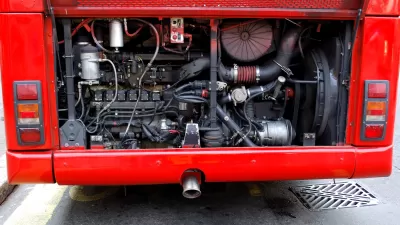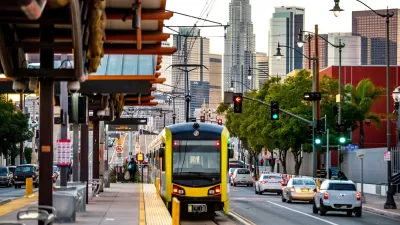Now that General Motors is facing financial ruin and seeking a federal bailout, Harvey Wasserman argues that before it receives any help, GM must redress its participation in the conspiracy to destroy America's mass transit system.
"Bail out General Motors? The people who murdered our mass transit system? First let them remake what they destroyed.
In a 1922 memo that will live in infamy, GM President Alfred P. Sloan established a unit aimed at dumping electrified mass transit in favor of gas-burning cars, trucks and buses. GM [had] lost $65 million in 1921. So Sloan enlisted Standard Oil (now Exxon), Philips Petroleum, glass and rubber companies and an army of financiers and politicians to kill mass transit.
GM has certainly proved itself unable to make cars that can compete while healing a global-warmed planet. So let's convert the company's infrastructure to churn out trolley cars, monorails, passenger trains, truly green buses."
FULL STORY: GM Must Re-Make the Mass Transit System it Murdered

Planetizen Federal Action Tracker
A weekly monitor of how Trump’s orders and actions are impacting planners and planning in America.

Maui's Vacation Rental Debate Turns Ugly
Verbal attacks, misinformation campaigns and fistfights plague a high-stakes debate to convert thousands of vacation rentals into long-term housing.

Restaurant Patios Were a Pandemic Win — Why Were They so Hard to Keep?
Social distancing requirements and changes in travel patterns prompted cities to pilot new uses for street and sidewalk space. Then it got complicated.

In California Battle of Housing vs. Environment, Housing Just Won
A new state law significantly limits the power of CEQA, an environmental review law that served as a powerful tool for blocking new development.

Boulder Eliminates Parking Minimums Citywide
Officials estimate the cost of building a single underground parking space at up to $100,000.

Orange County, Florida Adopts Largest US “Sprawl Repair” Code
The ‘Orange Code’ seeks to rectify decades of sprawl-inducing, car-oriented development.
Urban Design for Planners 1: Software Tools
This six-course series explores essential urban design concepts using open source software and equips planners with the tools they need to participate fully in the urban design process.
Planning for Universal Design
Learn the tools for implementing Universal Design in planning regulations.
Heyer Gruel & Associates PA
JM Goldson LLC
Custer County Colorado
City of Camden Redevelopment Agency
City of Astoria
Transportation Research & Education Center (TREC) at Portland State University
Jefferson Parish Government
Camden Redevelopment Agency
City of Claremont




























